FREE shipping on orders over $49!* Details
- All Products
- Outdoor
- Outdoor Cooking
- Outdoor Grills
Outdoor Grills
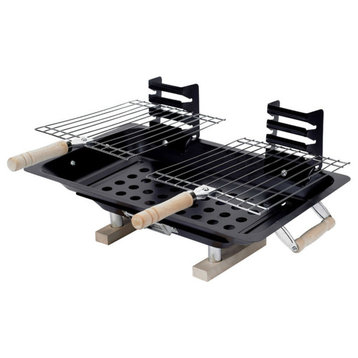
Marsh Allan 30002 Steel Hibachi Charcoal Grill, Blackby Marsh Allan(75)
$28
Highlights:
- Height: 7"
- Width: 17"
- Depth: 10"
- Product Type: Grill
- Fuel Type: Charcoal
- Color: Black
- Assembly Required: Yes
- Heat Thermometer: No
- Catch Pan Included: Yes
- Grill Type: Table Top
- Cooking Area: 133 sq. in.
- Grill Light Included: No
- Ignition Type: No Ignition System
- Grill Material: Steel
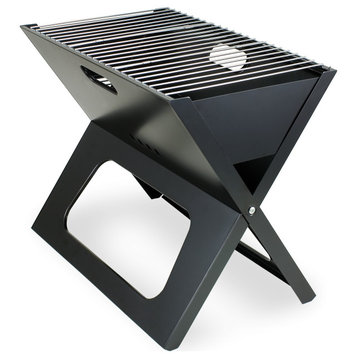
X-Grill - Blackby Picnic Time Family of Brands(76)
$68
Bring the BBQ wherever you roam with the X-Grill Portable Grill, a sleek, electro-plated steel tailgate Charcoal BBQ grill that packs down flatter than a pancake. This highly portable folding tailgate/camping grill sets up in seconds with its chrome tri-fold cooking grate and durable polyester canvas carrying tote with shoulder strap. Cook up some fun when camping, at a picnic, tailgating and more. All you need is charcoal/kindling and friends and you’re ready to get your BBQ on anywhere!
Best Seller
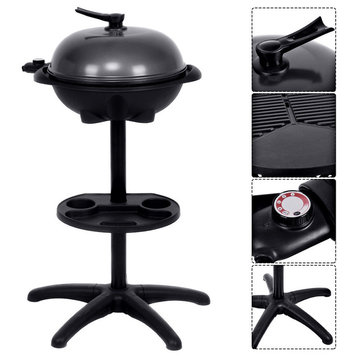
Costway Electric BBQ Grill 1350W Non-stick 4 Temperature Outdoor Campingby Costway(73)
$120
Enjoy a tasty barbecue without smoke by using our professional electric grill. 1350W power operated, features a variable temperature controller with four settings to adjust. According to different food or personal diet custom to choose the proper temperature for grilling. It features a removable tray just below the surface to depositary any naturally occurring grease or other liquids. The center of the bracket is equipped with 360 rotatable condiment tray, keeping the seasoning close at hand. Don't hesitate to buy it now!
Variable temperature controller with four settings to adjust
A grease collecting bowl below the surface
A 360 rotatable condiment tray, keeping the seasoning close at hand
Comes with a removable stand that lets you get the same delicious results indoors and outdoors
Assembly required
Feature
- High quality
Variable temperature controller with four settings to adjust
A grease collecting bowl below the surface
A 360 rotatable condiment tray, keeping the seasoning close at hand
Comes with a removable stand that lets you get the same delicious results indoors and outdoors
Assembly required
Specification
- Main Material: Aluminum plate & ABS
- Overall dimension: 24.8'' Wx24.8''D x 35.6''H
- Grill plate area: 400mm*400mm/15.7''*15.7''
- Voltage:120V/60Hz
- Power: 1350W
Package includes:
- 1 x Electric Grill
- 1 x Instruction
Best Seller
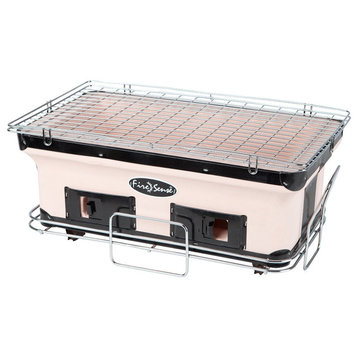
Yakatori Charcoal Grill, Large, Rectangleby Fire Sense(1240)
SALE
$53$80
Discover what the Japanese have recognized for centuries as the best grill construction — clay. The Yakatori Charcoal Grill is a genuine Japanese table barbecue. Handmade using insulating clay, the Yakatori Grill radiates heat, producing a juicier and more tender meal.
- Genuine Japanese table barbecue
- Handmade unfired clay construction (keep dry at all times)
- Adjustable ventilation
- Chrome cooking grate measures 17" x 10"
- Internal charcoal grates
- Stand with handles included
ATTENTION:
- Outdoor use only
- Avoid water damage: Store in a dry location when not in use
- Natural diatomite clay material may vay in color from light tan/gray to peach/pink. Color does not affect quality/performance.
Best Seller
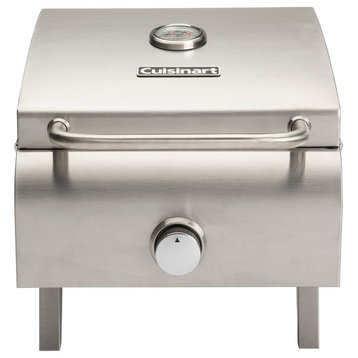
Professional Portable Gas Grill in Stainless Steelby Cuisinart(791)
SALE
$170$368
Professional Portable Gas Grill in Stainless Steel
The Cuisinart professional portable gas grill delivers the performance of a full sized grill with the convenience of portability. This grill fires up with 10,000 BTUs of meat-searing heat across 176 square inches of cooking space. With all of that power comes a lot of control as well. The one easily controllable burner allows you to sear meats at high temperatures then lower the temperature to allow food to cook through, and the built-in thermometer monitors the grill temp for you. The stainless finish will look as good at your home as it will on the road, and with an inner/protective liner in the lid, the beautiful steel look will stay looking good longer.
The Cuisinart professional portable gas grill delivers the performance of a full sized grill with the convenience of portability. This grill fires up with 10,000 BTUs of meat-searing heat across 176 square inches of cooking space. With all of that power comes a lot of control as well. The one easily controllable burner allows you to sear meats at high temperatures then lower the temperature to allow food to cook through, and the built-in thermometer monitors the grill temp for you. The stainless finish will look as good at your home as it will on the road, and with an inner/protective liner in the lid, the beautiful steel look will stay looking good longer.
Best Seller
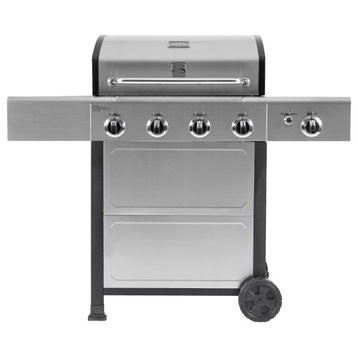
Kenmore 4 Burner Open Cart Gas Grill with Side Burnerby Kenmore(237)
$440
Feed your guests something to savor with the Kenmore 4 Burner Open Cart Propane Gas Grill with Side Burner in Stainless Steel and Black. With an impressive 622 square inches of cooking space, you'll be able to host all your friends. Cook up a storm with the 4 main burners plus a side burner that reaches to 13,000 BTU for cooking versatility and convenience. The electronic ignition, storage shelves & easy-to-clean design help you spend less time cooking & more time enjoying the party with your guests.
- Cook up to approximately 41 burgers with a total cooking surface of 622 square inches
- 4 main burners made of stainless-steel tube, each carries 10,000 BTU and includes one 13,000 BTU side burner with a total BTU of 53,000
- Black with black chrome plated knobs and handles provide a stylish touch
- Electronic ignition makes starting this grill as easy as pushing a button with individualized ignition system
- The propane tank is conveniently located with an open back, making bottle exchange a simple task
- Easily convert to natural gas with optional conversion kit PP-20400-CS (sold separately)
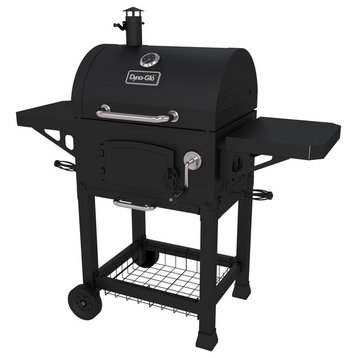
Dyna-Glo Heavy-Duty Compact Charcoal Grillby GHP GROUP, INC
SALE
$319$463
Anytime is the right time to cook on this heavy-duty charcoal grill from Dyna-Glo. Each cooking grate is made with porcelain enameled cast iron for maximum heat transfer and searing. Customize the cooking temperature by using the adjustment crank to raise and lower the charcoal tray. Reloading or stoking charcoal is made simple by opening the steel access door on the front of the grill. The smoke stack features an adjustable flue for additional temperature control. The high capacity ash pan is removable for quick and easy clean-up.
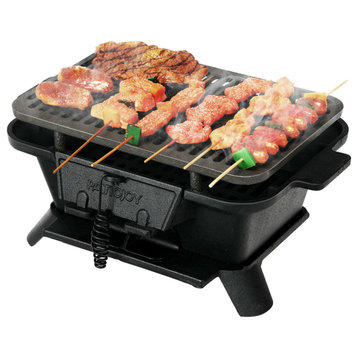
Costway Heavy Duty Cast Iron Charcoal Grill Tabletop BBQ Grill Stove Campingby Costway
SALE
$80$90
Enjoy the ultimate cookout and delicious food with this charcoal grill. Spacious cooking area allows you to cook plenty of delicious food, perfect for all sorts of outdoor activities from backyard parties to camping. Grilling net with two adjustable heights is designed to meet your different cooking needs, which can be used on both sides. Fire gate is considerately built to safely add and remove coal. Conforming to offer different flavors and tastes, the air regulating door helps to adjust the firepower. You just need to easily slide the door left or right. The charcoal grill design keeps the most original flavor of meat to meet your desire for smoke taste. Surrounded by savory and delicious aroma, surely you will like the charcoal grill.
Feature
Specification
- Color: Black
- Material: Cast Iron
- Product Dimensions: 15.5'' x 10.5'' x 7'' (L x W x H)
- Grilling Net Size: 12.5'' x 8.5'' (L x W)
- Charcoal Net Size: 9.5'' x 6'' (L x W)
- Net Weight: 20 lbs
Package includes:
- 1 X Charcoal Grill
- 1 X User Guide
Best Seller
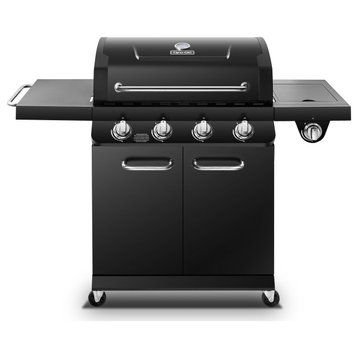
Dyna-Glo Premier 4 Burner Propane Gas Grillby GHP GROUP, INC(146)
$741
Install the ultimate barbecue station in your backyard with the 4 burner premier propane gas grill from Dyna-Glo. The options are limitless with this grill's combination of cooking power, quality construction, and features that simplify your grilling experience. With optimal cooking space and heating power, you can deliver a multi-course meal for your family and friends at your next backyard cookout. The easy-to-use integrated ignition system makes start-ups a breeze. Achieve restaurant-quality sear marks when you cook on this grill�s cast iron cooking grates. Move your grill hassle-free to the ideal cooking spot or into storage with its four caster wheels. Upgrade your backyard or patio today with this sleek and powerful grill from Dyna-Glo, and become the BBQ boss you were always meant to be.
- 483 Square inches of primary cooking space accommodates up to twenty-three 4� burgers
- Includes 673 square inches of total cooking space
- EquiHeat� technology powers even heat distribution with four primary stainless steel tube burners, delivering 48,000 primary BTUs
- An additional 12,000 BTU side burner includes a flush-mounted cover to allow extra cooking or storage space when you need it
- Delivers optimal cooking power with a total of 60,000 BTUs
- Cast iron cooking grates provide the ideal surface for retaining and transferring heat directly to food
- Easy mobility with 4 casters (2 casters lock for stability)
- Power up the grill hassle-free with the quick-start integrated ignition
- Tool hooks and a towel holder provide convenient storage for your grilling accessories
- Protect your grill with a Dyna-Glo DG400C premium cover (sold separately)
EdgeStar ESB2LP 26000 BTU 13"W Liquid Propane Side Burner - Stainless Steelby EdgeStar
$649
Features: 2 burners operating at 13,000 BTU each 195 square inch total cooking area High-quality T-304 stainless steel construction Durable piezo ignition system LED lighting keeps control knobs easily visible in subdued light T-304 Stainless steel lid prevents debris falling in side burner when not in use 90 day labor warranty with 1 year parts warranty on ignition, lighting, electronics, wiring and valves; 3 year parts warranty on body of burner, and main burner Specifications: Total BTUs: 26000 Total Cooking Area: 195 cu. in. Number of Burners: 2 Control Type: Turn Knob Fuel Type: Liquid Propane Burner Style: Brass Width: 13" Depth: 24-7/8" Height: 12-1/8" Overall Height: 13-7/8" (includes handle) Product Weight: 40 lbs
Best Seller
Kenmore 4 Burner with Side Burner Open Cart Gas Grillby Kenmore(142)
$440
Feed your guests something to savor with the Kenmore 4 Burner with Side Burner Open Cart Propane Gas Grill in Stainless Steel and Black. With an impressive 622 square inches of cooking space, you'll be able to host all your friends. Cook up a storm with the 4 main burners plus a side burner that reaches to 13,000 BTU for cooking versatility and convenience. The electronic ignition, storage shelves & easy-to-clean design help you spend less time cooking and more time enjoying the party with your guests.
- Cook up to approximately 41 burgers with a total cooking surface of 622 square inches
- 4 main burners made of stainless-steel tube, each carries 10,000 BTU and includes one 13,000 BTU side burner with a total BTU of 53,000
- Black with black chrome plated knobs and handles provide a stylish touch
- Electronic ignition makes starting this grill as easy as pushing a button with individualized ignition system
- The propane tank is conveniently located with an open back, making bottle exchange a simple task
- Easily convert to natural gas with optional conversion kit PP-20400-CS (sold separately)
Best Seller
Dutton Char-Broil Infrared Propane Gas Grill Single, Outdoor Grillingby Gyber(133)
SALE
$129$309
There's nothing quite like enjoying a thick, juicy steak when summer is in full swing, cooking up some shrimp when you're tailgating, or sharing in some burgers with friends; especially when you've got an easy-to-use Dutton Infrared Grill! These propane grill systems heat up quickly, provide even heat distribution and cooking, and let you load up your favorite meats, vegetables, and snacks so everyone can have a great time enjoying amazing food.
Versatile Cooking Accessory – This gas infrared grill can be used to make all types of food, including steaks, burgers, salmon, pizza, lamp chops, chicken breast and more.
Rapid Heating Element – Being able to hit temperatures up to 1500°F in minutes makes cooking becomes easier and more efficient; help retain aromas, flavors, and natural food qualities.
Light, Portable Design – This propane infrared grill can be used in the backyard for hosting parties, cooking at the park, or serving up a hot meal when camping.
Quick and Easy Cleanup – Crafted with food-grade safe 430 stainless steel this gas grill is easy to assemble, dissemble, clean and dishwasher-friendly.
Features:
Infrared Grill System – Offering the ultimate barbecue experience this gas grill featuring a push start ignition is easy to set up and let you fire up the oven in seconds.Versatile Cooking Accessory – This gas infrared grill can be used to make all types of food, including steaks, burgers, salmon, pizza, lamp chops, chicken breast and more.
Rapid Heating Element – Being able to hit temperatures up to 1500°F in minutes makes cooking becomes easier and more efficient; help retain aromas, flavors, and natural food qualities.
Light, Portable Design – This propane infrared grill can be used in the backyard for hosting parties, cooking at the park, or serving up a hot meal when camping.
Quick and Easy Cleanup – Crafted with food-grade safe 430 stainless steel this gas grill is easy to assemble, dissemble, clean and dishwasher-friendly.
Including:
- 1 Cooking Grill
- 1 Grill handle
- 1 Grease Pan
- 1 set of Pizza stone / shovel
Char-Broil Cb Charcoal Tabletop Grillby Char-Broil
$43
Charbroil 187 sq. in. cooking surface Easy-to-clean chrome plated cooking grid Folding legs to secure top for easy portability Convenient lid hanging hook Heat resistant handles Quality steel construction with durable finish.
SteelWorks 11787 Weldable Diamond Metal Sheet, 1/2" x 24", 18 Gaugeby SteelWorks
$45
The most economical and most common form of steelworks diamond metal sheet built from high quality material and cold rolled, 50% stronger than hot rolled. Used in a variety of welding applications, include security grates & BBQ grill
- 18 Gauge
- Finish: Plain
- 1/2" x 24" x 24"
- Low carbon steel
- Diamond metal sheet
- Cold rolled, 50% stronger than hot rolled
- Used in a variety of welding applications, cut, expanded & flattened into a diamond shaped pattern.
vidaXL Barbecue Grill Charcoal Grill BBQ Grill for Outdoor Camping Picnicby vidaXL LLC
SALE
$215$275
This heavy-duty charcoal-fueled BBQ grill is ideal for creating an outdoor feast for your family and friends. It will make your outdoor cooking experience sizzle, effectively turning your backyard into a second kitchen! Using charcoal as fuel, this barbecue grill is suitable for grilling, broiling and smoking. You can monitor the temperature in the chamber with the integrated thermometer on the hood. Thanks to the powder-coated steel body, our barbecue grill has a sleek and stylish design and is very durable. It has 2 pieces of enamelled cooking grid and a heavy-duty hood. Two foldable side tables offer additional space for creating sauces or your favorite side dishes. Equipped with 2 castors, this grill is easy to move around. This barbecue grill will surely be an indispensable part for your outdoor activities!
- Color: Black
- Material: Powder-coated steel
- Overall dimensions: 38.2" x 22.4" x 39" (W x D x H)
- Cooking area size: 16.9" x 12.6" (L x W)
- Height of cooking area from the ground: 32.3"
- Height adjustable charcoal tray
- With an integrated thermometer
- Warming rack included
- With bottle opener
- With bottom shelf
- Foldable side tables
- With 2 sturdy castors for mobility
- WARNING There may be local legal requirement about using this product. Please follow the legal requirement.
- California Proposition 65
- Warning: Cancer and Reproductive Harm – www.P65Warnings.ca.gov.
Best Seller
Fuego Professional Carbon Steel Grillby FUEGO(654)
$595
With features like non-mark industrial casters, reliable door clasp, easy residue removal and a boost in BTU's, the Fuego Professional Carbon Steel Grill vastly improves your cooking experience.
- Non-marking industrial casters ensure a smooth and stable roll
- Door clasp keeps front panel closed securely
- Improved residue removal system by removing 100+ sq. in. of surface area from the fire bowl to allow cooking debris to drop straight into residue tray
- Dual-zone burner system
- Added a 25% boost in BTU's up to 26,500 BTU/hr
- Increased the grill surface area to 415 sq. in. of grilling area and 110 sq. in. warming rack
- Combined grilling area of 525 sq. in.
- Large enough for cooking 20 burgers at once
- 28" x 28" footprint with the lid open
- 24"x24" footprint with the lid closed
- Added hood hinges at a 45-degree angle
- 9" of grilling height below the lid is perfect for a beer can chicken
- Finish: Black
- Material: Steel
- Dimensions: W 24" x D 24" x H 49"
Best Seller
Stainless Steel Foldaway Charcoal Grillby Fire Sense(84)
SALE
$44$69
We are pleased to offer the finest in contemporary design and quality in the Foldaway Charcoal Grill. The Foldaway Grill is the perfect portable charcoal grill. The clever design allows this unit to stand 8 inches high for use and fold flat in seconds. Constructed of durable stainless steel, this sturdy grill folds flat to fit in its own carrying case.
WARNING: The combustion of wood, charcoal, and other fuels can expose you to chemicals including soot, which is known to the State of California to cause cancer, and carbon monoxide, which is known to the State of California to cause birth defects or other reproductive harm. For more information go to www.P65Warnings.ca.gov.
WARNING: This product can expose you to chemicals including Diisononyl Phthalate (DINP), which is known to the State of California to cause cancer and birth defects or other reproductive harm. For more information go to www.P65Warnings.ca.gov.
WARNING: This product can expose you to chemicals including Di(2-ethylhexyl)phthlate (DEHP), which is known to the State of California to cause cancer and birth defects or other reproductive harm. For more information go to www.P65Warnings.ca.gov.
- Simple fold-open design with integrated charcoal platform and ash catcher
- Cooking grate and detachable handles store flat with grill
- Easy to store
- Stainless steel won't peel or flake
- Super slim and lightweight portable grill
- 3.5mm cooking bars
- 14.875" x 7.5" cooking surface area
- Assembled Dimensions: 18.5"L x 8.5"W x 7.75"H; Weight: 7.5lbs
- Folded Dimensions: 17"L x 8.75"W x 1"H
WARNING: The combustion of wood, charcoal, and other fuels can expose you to chemicals including soot, which is known to the State of California to cause cancer, and carbon monoxide, which is known to the State of California to cause birth defects or other reproductive harm. For more information go to www.P65Warnings.ca.gov.
WARNING: This product can expose you to chemicals including Diisononyl Phthalate (DINP), which is known to the State of California to cause cancer and birth defects or other reproductive harm. For more information go to www.P65Warnings.ca.gov.
WARNING: This product can expose you to chemicals including Di(2-ethylhexyl)phthlate (DEHP), which is known to the State of California to cause cancer and birth defects or other reproductive harm. For more information go to www.P65Warnings.ca.gov.
Dyna-Glo Signature Series Pellet Grill 700 Total Sq Inby GHP GROUP, INC(37)
$550
This Dyna-Glo Signature Series 706 Total Sq. In. Wood Pellet Grill and Smoker features the ability to sear, smoke, bake, braise, roast and grill like a pro. Perfect your steakhouse quality sear with the direct heat cooking system, equipped with an adjustable damper that allows you to quickly raise the surface temperature of the matte enameled cast iron cooking grates to over 500 degrees with the lid open. The temperature dial ranges from the initial smoke setting at approximately 150 degrees, up to the highest setting at approximately 450 degrees. Desired temperatures can be adjusted in 25-degree increments. The 20 lb. pellet hopper is top loading and provides approximately 30 hours of burn time. The back of the hopper includes a chute for easily switching pellet varieties or for clearing out pellets after use. Temperatures are thermostatically controlled, with the turn of a dial or push of a button, to help keep your grilling or smoking temperature right where you need it. The pellet grill also includes two meat probes with integrated control panel jacks. The temperature read-outs for both probes and the overall temperature of the grill will be shown on the display simultaneously. A feed button manually engages the auger for quickly raising the firebox temperature just before opening the lid. The 706 total sq. in. cooking space includes 504 sq. in. of primary space on the matte enameled cast iron cooking grates, and a 202 sq. in. porcelain coated wire grates warming rack. This pellet grill has a 200W power igniter and 25W motor and comes with a one-year limited warranty.
Dyna-Glo 5 Burner Open Cart Propane Gas Grillby GHP GROUP, INC
SALE
$412$581
This quality 5 burner gas grill with side burner combines performance, durability and design. Utilizing 60,000 BTU's over the 483 square inches of primary cooking area and heavy gauge cooking grates, this Dyna-Glo grill has everything the backyard chef needs to grill for family and friends.
Best Seller
Coghlan's Tri-Pod Grill, 17"by Coghlan's Ltd(149)
$50
Ideal for cookouts, this grill can be placed anywhere. Its stable height adjustable grill surface is supported by a 3pc. galvanized steel tri-pod. The legs are shock-corded together and collapse for easy storage.
- Diameter: 17"
- Chrome grill.
- For charcoal or wood fires
- Adjustable height, 55" max. 18" dia. cooking surface
- Galvanized legs
- Boxed
Costway Double Burner Gas Propane Cooker Outdoor Picnic Stove Stand BBQ Grillby Costway(61)
$93
This Grill is perfect for any excursion. The cooker has two 150000 BTU cast burners and a 450 sq. cooking surface. The cooker legs snap on and off for easy transport and storage. Cook all your foods to perfection every time. Try the suggestions in our detailed instruction and recipe booklet, or create your own favorites!
3.35 sq.ft. cooking surface lets you prepare meals for a group
Removable, adjustable legs allow stable placement and help make transport and storage easy
Fully adjustable heat dial per burner
250 PSI MAXIMUM Inlet Pressure Outlet Pressure Adjustable From 0-20 PSI 150000 BTU
Rugged Design is built to last
Heavy duty cast iron
Perfect for Outdoor Activities
Feature
- 150,000 BTU of cooking power
3.35 sq.ft. cooking surface lets you prepare meals for a group
Removable, adjustable legs allow stable placement and help make transport and storage easy
Fully adjustable heat dial per burner
250 PSI MAXIMUM Inlet Pressure Outlet Pressure Adjustable From 0-20 PSI 150000 BTU
Rugged Design is built to last
Heavy duty cast iron
Perfect for Outdoor Activities
Specification
- Product Type:Double burner
- Primary Material:Cast iron
- Dimensions :31'' x 15-3/4'' x 28-1/2'';
- Cooking area :3.35 sq.ft.
- Gas:LPG;
- BTU :150,000
- Finish:Black ;Weight :26 LBS
Package includes:
- 1 x double burner stove;
- 1 x 0-20 PSI regulator with hose;
- 1 x Instruction
Best Seller
Kenmore 3 Burner Gas Grill with Side Shelves, Azuraby Kenmore(771)
$554
The Kenmore 3 Burner Pedestal Propane Gas Grill with Foldable Side Shelves is both stylish and spacious. This smartly designed pedestal grill comes with a compact pedestal base and provides 512 sq. inches of uncompromising cooking space while packing 30,000 BTUs of power. It features foldable side shelves for efficient storage when not in use and plenty of shelf space for convenient food prep, with 6 tool hooks for easy access to cooking utensils making this grill an attractive option for smaller outdoor patio spaces. The enclosed cabinet safely houses the propane tank. This 3-burner patio grill has many convenient features such as electronic ignition for quick and easy lighting of the 3 premium stainless steel burners, porcelain-coated cast iron cooking grates for exceptional heat retention and even cooking, a durable layer porcelain-enameled lid and a stainless steel handle. Features 2 wheels and a push bar for easy mobility. Once the grill is in desired location, set in place with the 2 adjustable feet for extra stability. 1 year limited warranty with 5 years on the stainless steel burner.
- Cook up to approximately 33 burgers on a total cooking surface of 512 Square inches; 381 Square inches of primary cooking surface and 131 square inches of secondary cooking surface
- Easy to use folding side shelves make it easy to store or position grill; side shelves create an easy to use cook and prep space on any size patio
- 3 main burners made of stainless steel, each carry 10,000 BTU for a total BTU of 30,000
- Powder coated surfaces and side shelves makes this grill last even in the toughest conditions
Best Seller
Chef's Style Tabletop Gas Grill, Stainless Steelby Cuisinart(5197)
$213
The Cuisinart CGG-306 Chef's Style Tabletop Gas Grill is a powerful combination of raw grilling performance and great design. This grill goes from box to burgers in less than 10 minutes with no tools required. Two stainless steel burners combine for a total of 20,000 BTU's of meat-searing heat sparked by a simple TwistStart ignition system. Control your grilling experience with infinitely adjustable knobs and monitor the temperature with the integrated lid thermometer. This grill is constructed entirely of stainless steel for the high-quality look and performance you would expect from Cuisinart. The stainless steel grill-grate is professional quality and allows for superior heat transfer, cooking and cleaning. Feel free to show this grill off while tailgating or camping since this unit travels as well as it cooks. Simply lock the lid down, fold the legs, grab the handle and you're off to grill wherever you please.
Best Seller
Ceramic Barbecue, Bluestone Gray, 13"by BergHOFF International Inc.(30)
SALE
$373$485
The ceramic shell produces high temperatures for searing, roasting and grilling, but also allows for low-temperature smoking. Constructed for a uniform heat circulation resulting in fast and consistent cooking. The top venilation cap allows you to control the air with precision and the thermometer on the lid monitors the temperature inside for precise cooking with perfect results. Fired with lump charcoal or aromatic woods. High quality, top of the line construction.
Costway Outdoor BBQ Grill Charcoal Barbecue Pit Patio Backyard Meat Cookerby Costway(166)
$140
This is our practical and fashionable charcoal grill which will enable you to enjoy outdoor cooking with your family and friends. Made of durable steel, this BBQ grill anti-rust and will give you years of dependable use. You will never regret to buy it! Just place the order now!
Attached Steel Firebox For Reduce Smoking And Offset Heat
Convenient Side Shelf Can Hold Food And Tools
Perfect For Outdoor Use
Feature
- Heavy Duty And Solid Construction
Attached Steel Firebox For Reduce Smoking And Offset Heat
Convenient Side Shelf Can Hold Food And Tools
Perfect For Outdoor Use
Specification
- Color: Black
- Material: Steel
- Overall Dimension:45.5 " (L) X 24.5' (W) X42.5" (H)
- Wooden shelf area: 24.5"(L) X7.5'(W)
- Product Weight: about 29.5 lbs
vidaXL BBQ Stand Charcoal Barbecue 2 Wheels Charcoal Barbecue Grill Smoker Bbqby vidaXL LLC
SALE
$165$221
This classical charcoal barbecue stand, made of sturdy and durable steel, has a high-quality construction. Working on charcoal, this barbecue stand features multiple functions like grilling, baking and smoking for picnics, parties, campings, outings, etc.
Including 2 grills, this barbecue stand has a total grill plate size of 27.6" x 19.7", ensuring a relatively large space to accommodate your food. There is a side shelf and a lower shelf which is handy to store your barbecue accessories. Thanks to the 2 wheels, it is very easy to move the barbecue stand around.
Including 2 grills, this barbecue stand has a total grill plate size of 27.6" x 19.7", ensuring a relatively large space to accommodate your food. There is a side shelf and a lower shelf which is handy to store your barbecue accessories. Thanks to the 2 wheels, it is very easy to move the barbecue stand around.
- Material: Steel
- Overall dimensions: 45.3" x 24" x 35.4" (L x W x H)
- Grill plate size: 28" x 20"
- 2 wheels
- California Proposition 65
- Warning: Cancer and Reproductive Harm – www.P65Warnings.ca.gov.
Best Seller
Marsh Allan 5 Table Top Charcoal Grill, 12" D x 8" Hby Kay Home Products(23)
$23
Highlights:
- 12"d x 8"h
- Shrink wrapped
- Tool-free assembly
- 95 sq. in. cooking surface
- 3 potition adjustable cooking grid
- Legs lock into grill bowl for stability
- Legs slide in and out of a heavy steel bowl for easy use and storage
Dyna-Glo Premium Large Charcoal Grill Coverby GHP GROUP, INC(1313)
$53
Provide year-round protection for your grill, with this Dyna-Glo Premium BBQ Cover. Made with water resistant, heavy-duty PVC shell and 600 Denier polyester lining to withstand harsh elements. Double-stitched seams provide additional strength and durability to help prolong the life of the cover. This cover also features durable nylon side handles for easily removing or handling the cover before and after use; Hook and loop fastener adjustment straps for a customized fit and mesh side vents that provide much needed airflow for keeping the grill moisture free. Cover dimensions: 61.7" W x 24.8"D x 47.9"H (156.7 x 63 x 121.85cm). Fits charcoal grills with smoke stack (left side) and assembled dimensions of up to 60.8" W x 28.43"D x 51.6"H (154.4 x 72.2 x 129.5cm)
Best Seller
Permasteel 2 Burner Gas Grill with Folding Side Shelves, Copperby Permasteel, Inc(51)
$438
The Permasteel 2-burner patio grill is both stylish and spacious. This smartly designed pedestal grill comes with a compact pedestal base and provides 360 sq. inches of uncompromising cooking space while packing 22,000 BTUs of power. It features foldable stainless steel side shelves for efficient storage when not in use and plenty of shelf space for convenient food prep, with 6 tool hooks for easy access to cooking utensils making this grill an attractive option for smaller outdoor patio spaces. The cabinet safely houses the propane tank which is easily accessible through the swing door. This 2-burner patio grill has many convenient features such as electronic ignition for quick & easy lighting of the 2 - premium stainless steel burners, porcelain-coated cast iron cooking grates for exceptional heat retention and even cooking, a durable layer porcelain-enameled lid, and a stainless steel handle. features 4 wheels for easy mobility. 1 Year Limited warranty.
- Cook up to approximately 24 burgers on a total cooking surface of 360 square inches, 264 square inches of primary cooking surface and 96 square inches of secondary cooking surface
- Easy to use folding side shelves make it easy to store or position grill; side shelves create an easy to use cook and prep space on any size patio
- 2 main burners made of stainless-steel, each carry 11,000 BTU for a total BTU of 22,000
- Electronic ignition makes starting this grill as easy as pushing a button
- Powder coated surfaces and stainless steel side shelves makes this grill last even in the toughest conditions
Kingsford® OG2001901-KF BBQ Charcoal Kettle Grill, 22.5"by Rankam Group Ltd(52)
$128
Crafted using steel with a durable porcelain coating and an air vent for better temperature control, this Kingsford® Charcoal Kettle Grill will get all your parties cooking. You can even take your act on the road with wheels for easy transportation and a bottom rack for extra storage. This grill features a zinc charcoal grate and a hinged lid that makes the setting up process easy. The chrome-plated cooking grate and warming rack are easy to clean and help ensure that all your food reaches the table while it is still warm. An added condiment and tool basket adds extra convenience.
- Size: 22.5"
- Chrome plated cooking grate and warming rack
- Hinged lid, ash catcher
- Durable porcelain coated lid and body
- With condiment/tool basket
- Total cooking area: 525 square inches
- Primary cooking area: 363 square inches
- Warming rack cooking area: 162 square inches
Blackstone 1554 Griddle Cooking Station, 60000 BTU, 756 Sq. In.by Blackstone(2069)
$546
Updated with a reinforced frame and high-efficiency burners, this cook station offers restaurant-quality performance with incredible versatility. Other improvements over previous versions include reinforced side shelves, lockable casters and smooth-rolling wheels, larger drip pan, and a lower shelf with deeper lip. Tough corners and heavy-duty leg braces provide lasting durability. Each independently controlled burner assembly produces 15,000 BTU for fast, even cooking. Includes the stand with propane burners and a 3/16-thick, cold-rolled steel griddle.Cooking surface: 36L x 20W. Weight: 130 lbs. Available: 36 Griddle Station.
Highlights:
- Size: 36" x 21"
- 756 sq. in cooking surface
- Heat output up to 60,000 BTUs
- 4 independent burners, low to high settings
- Electric push button igniter
- Long life stainless steel tube burners
- Thick rolled steel surface
- Pre seasoned non rust finish
- 2" high sidewalls
- Griddle top removes easily and in seconds
- Grease can
- Fold and go design
- Four industrial caster wheels, two are lockable
- Regulator hose included
- Side shelves for storage
Best Seller
Fuego F27S-Griddle-B Built-In All 304SS Gas Griddleby FUEGO(5)
SALE
$1,432$1,749
New for 2021, we are excited to present our new Fuego all 304 Stainless Steel gas grill. We set out to design a grill that eliminated all of The bulky features seen on most gas grills. We tackled the front panel first. Due to our unique construction, we eliminated The bulbous front end & Developed a sleek flat front panel design. True to Fuego form, our performance specs Remain impressive heating to 500F in just 5 minutes and up to 650F in 10 Min. The grill gets hot! This eliminates several Min of preheat time & produces amazing sear marks. Its wide temperature control ranges from 250f-650f allowing your true chef skills to shine while preparing a wide variety of dishes sure to impress your guests.
Best Seller
Kenmore 4 Burner Open Cart Gas Grill with Side Burnerby Kenmore(195)
$429
Feed your guests something to savor with the Kenmore 4 Burner with Side Burner Open Cart Propane Gas Grill in Stainless Steel and Black. With an impressive 622 square inches Of cooking space, you'll be able to host all your friends. Cook up a storm with the 4 main burners plus a side burner that reaches to 13,000 BTU for cooking versatility and convenience. The electronic ignition, storage shelves & easy-to-clean design help you spend less time cooking & more time enjoying the party with your guests.
- Cook up to approximately 41 burgers with a total cooking surface of 622 square inches
- 4 main burners made of stainless-steel tube, each carries 10,000 BTU and includes one 13,000 BTU side burner with a total BTU of 53,000
- Stainless steel and powder coated surfaces and side shelves makes this grill last even in the toughest conditions
- Electronic ignition makes starting this grill as easy as pushing a button with individualized ignition system
- The propane tank is conveniently located with an open back, making bottle exchange a simple task
- Easily convert to natural gas with optional conversion kit PP-20400-CS (sold separately)
2-in-1 Outdoor Electric Grillby Cuisinart(134)
$153
The Cuisinart 2-in-1 outdoor electric grill is the perfect small space grilling solution. The grill takes less than 10 minutes to assemble, so you'll be up and grilling in no time. The grill features a 120V heating element that allows the cooking surface to reach temperatures of 550+ degrees. The grill is able to be used in 2 ways; on the stand, or on a table top. The grill easily lifts right off the stand and can be used on any table top surface. The non-stick cooking surface is super easy to clean and features 240 square inches of cooking space, allowing you to grill up to 12 burgers at a time. The temperature control probe comes with 5 adjustable heat settings, allowing you to dial in the temperature exactly where you need it. The center of the cooking surface includes a channel that allows the grease to easily drain directly in to the cup located below the surface.
American Renaissane Grills 304 Stainless Steel Double Side Burner w/LED Lightsby RCS
$999
Bring a little bit of your indoor kitchen outdoors. The ARG double side burner is constructed of 304 stainless steel construction for maximum strength and stability. This side burner features:
- Made in the USA
- Dual brass burners each burner with 17,5000 BTU's for a total of 35,000 BTU's.
- Blue LED lights.
- Transformer Included.
- Stainless Steel Cooking Grid.
- Removable Lid Included.
- Cut out Dimensions: 13 1/2" W x 24 1/4" D x 11 1/2" H
- Notice: Must be installed in a non-combustible cabinet for outdoor kitchen applications.
Broil Mate 730114 LP Gas Grill, 390 sq. in., Blackby Broilmate(21)
$385
Highlights:
- Black color
- 2 Shelves
- Grill Material: Porcelain
- Assembled Height: 43"
- Assembled Width: 20"
- Assembled Depth: 5"
- 5,000 BTU stainless steel burner system
- 390 sq. in. total cooking surface including chrome coated warming rack
- 240 sq. in. primary cooking surface
- Porcelain coated wire cooking grids
- Aluminized steel cooking system
- Sure-Lite ignition system
- Stand Alone grill
- Accu-Flow burner valves
- Electrical Ignition
- Matte finish
- Heat Thermometer
- Wheeled
- Warming Rack
- Durable cast aluminum cook box
- Resin Perma-mold side shelves with integrated tool hooks
- CSA Listed
- ANSI Certified
Build a home that reflects the best version of you
Free Shipping
Get free delivery on orders $49+ and stress-free refunds.
Curated Marketplace
Shop thousands of hand-picked pieces in a variety of styles.
Top Customer Service
Expert help is our number one priority (and we’re #1* at giving it).
Beyond Products
Find Inspiration and professionals to achieve your dream home.
*Per Newsweek’s list of “America’s Best Customer Service 2023” in the category of “Online Retailers: Home Goods for Online Home Stores”
Nothing tastes quite like fresh food off the barbecue grill. Gas grills, charcoal grills and even an outdoor electric grill each give your food a distinct taste. Whether you’re planning on firing up a smoker or gas BBQ this season, you’ll need to consider size, grates and general construction to ensure you’re making the right purchase for your grilling needs.
This depends on your cooking preference, what you feel comfortable with and ultimately how you’d like your food to taste. See below for the pros and cons of each option.
Charcoal: Using charcoal briquettes, wood or a combination of both, charcoal grills give food an unmistakable smoked BBQ flavor. While many pine after this distinct taste, cooking might take more time, and the grill itself requires more maintenance, since you will need to dispose of ashes regularly. Look for a charcoal barbecue with air vents to maintain control over the internal temperature.
Gas: Gas grills require less time for cooking and heat quickly with a push button, rotary or electronic lighter. They’re often more spacious and less expensive to use, since gas is cheaper than charcoal. However, gas tanks are heavy, and you need to pay attention to the gas level to avoid a run to the store in the middle of cooking.
Electric: Electric grills have improved greatly and cook much better than they did in the past. They’re great for spaces that won’t allow gas or charcoal grills, however, you’ll need to place it in proximity to an electrical outlet, which can be tricky to find outdoors.
Smokers: A smoker grill will allow you to cook or flavor food, typically meat and fish, by exposing it to heat and smoke in a controlled environment. The smoky flavor of the food will depend on the type of wood you choose to burn. Improved preservation is an added benefit of smoking your food.
There are several features you want to be sure your barbeque grill contains. Make sure yours is well-constructed and doesn't wiggle on solid ground. If there are wheels, they should roll easily. Keep an eye out for good fit between all the pieces and a smooth finish that will hold up to the elements. Take note of assembly requirements. Better brands tend to offer easier assembly; they will also offer adequate service and maintenance through assurance of replacement parts, easy-to-read instructions, a toll-free service line and a long warranty. Safety, of course, is key: Grills should control heat easily, stay cool to the touch and have appropriate safety features.
There are several questions to ask yourself when deciding what size barbeque is best for you and your grilling needs. To begin, think about what you will be cooking, as well as the quantity. For example, if you’ll be making small dinners of chicken breast and grilled vegetables for you and your family, you’ll need less room than if you’re planning on grilling briskets for large parties.
How often will you be using the grill? If it’s only for special occasions, waiting 20-25 minutes for a charcoal grill to warm up may not be a bother. If you’re using it daily, you may prefer the quicker prep time that gas grills afford. Also take into account the space you have for the barbecue — a small balcony off an apartment building will have considerably less room than a backyard patio. For smaller areas, consider a portable BBQ that you can move aside to regain precious space when not in use.
Also called grids, grill grates differ in regard to durability, maintenance and heat retention. See below for four common options.
Cast iron: Cast iron grates cook food well by evenly distributing heat. However, they are heavy and require care to prevent rust.
Porcelain-coated: Food won’t stick to porcelain-coated grates, but the glaze can chip and rust if not maintained.
Porcelain-coated cast iron: Durable, long-lasting and easy to maintain, porcelain-coated cast iron grates retain heat well and are resistant to rust.
Stainless steel: These will resist rust, but you may have trouble with food sticking to stainless steel grates. Rubbing a halved onion on the grid before throwing your food on has been known to help prevent sticking (and add some extra flavor!).
Our selection of outdoor grills range from electric to charcoal to gas, which allows you find the one that will best fulfill your grilling appetite.
Should I choose a charcoal grill or gas grill?
This depends on your cooking preference, what you feel comfortable with and ultimately how you’d like your food to taste. See below for the pros and cons of each option.
Charcoal: Using charcoal briquettes, wood or a combination of both, charcoal grills give food an unmistakable smoked BBQ flavor. While many pine after this distinct taste, cooking might take more time, and the grill itself requires more maintenance, since you will need to dispose of ashes regularly. Look for a charcoal barbecue with air vents to maintain control over the internal temperature.
Gas: Gas grills require less time for cooking and heat quickly with a push button, rotary or electronic lighter. They’re often more spacious and less expensive to use, since gas is cheaper than charcoal. However, gas tanks are heavy, and you need to pay attention to the gas level to avoid a run to the store in the middle of cooking.
Electric: Electric grills have improved greatly and cook much better than they did in the past. They’re great for spaces that won’t allow gas or charcoal grills, however, you’ll need to place it in proximity to an electrical outlet, which can be tricky to find outdoors.
Smokers: A smoker grill will allow you to cook or flavor food, typically meat and fish, by exposing it to heat and smoke in a controlled environment. The smoky flavor of the food will depend on the type of wood you choose to burn. Improved preservation is an added benefit of smoking your food.
What do I want to look for in outdoor grills?
There are several features you want to be sure your barbeque grill contains. Make sure yours is well-constructed and doesn't wiggle on solid ground. If there are wheels, they should roll easily. Keep an eye out for good fit between all the pieces and a smooth finish that will hold up to the elements. Take note of assembly requirements. Better brands tend to offer easier assembly; they will also offer adequate service and maintenance through assurance of replacement parts, easy-to-read instructions, a toll-free service line and a long warranty. Safety, of course, is key: Grills should control heat easily, stay cool to the touch and have appropriate safety features.
What size barbecue grill should I look for?
There are several questions to ask yourself when deciding what size barbeque is best for you and your grilling needs. To begin, think about what you will be cooking, as well as the quantity. For example, if you’ll be making small dinners of chicken breast and grilled vegetables for you and your family, you’ll need less room than if you’re planning on grilling briskets for large parties.
How often will you be using the grill? If it’s only for special occasions, waiting 20-25 minutes for a charcoal grill to warm up may not be a bother. If you’re using it daily, you may prefer the quicker prep time that gas grills afford. Also take into account the space you have for the barbecue — a small balcony off an apartment building will have considerably less room than a backyard patio. For smaller areas, consider a portable BBQ that you can move aside to regain precious space when not in use.
What types of grill grates are available?
Also called grids, grill grates differ in regard to durability, maintenance and heat retention. See below for four common options.
Cast iron: Cast iron grates cook food well by evenly distributing heat. However, they are heavy and require care to prevent rust.
Porcelain-coated: Food won’t stick to porcelain-coated grates, but the glaze can chip and rust if not maintained.
Porcelain-coated cast iron: Durable, long-lasting and easy to maintain, porcelain-coated cast iron grates retain heat well and are resistant to rust.
Stainless steel: These will resist rust, but you may have trouble with food sticking to stainless steel grates. Rubbing a halved onion on the grid before throwing your food on has been known to help prevent sticking (and add some extra flavor!).
Our selection of outdoor grills range from electric to charcoal to gas, which allows you find the one that will best fulfill your grilling appetite.
Join the discussion about “Outdoor Grills”
Get advice from our community of pros & homeowners
Outdoor Grills - DCS vs. American Outdoor Grill
by nandakumar
Appliances
21
 +19
+19
Lynx Grill or Other Outdoor Grill Recs
by jmcgowan
Appliances
4
 +2
+2
Building an outdoor kitchen - looking for Outdoor grill
by Vi Luo
AppliancesRemodeling
Be the first to comment
Outdoor grill kitchen support
by shnewyork
Landscape DesignBuilding a HomePorches & Decks
2

Any advice on cleaning soot off stucco wall behind on outdoor grill?
by patteager
Before & AfterPorches & Decks
4
 +2
+2
Item 1 of 5






